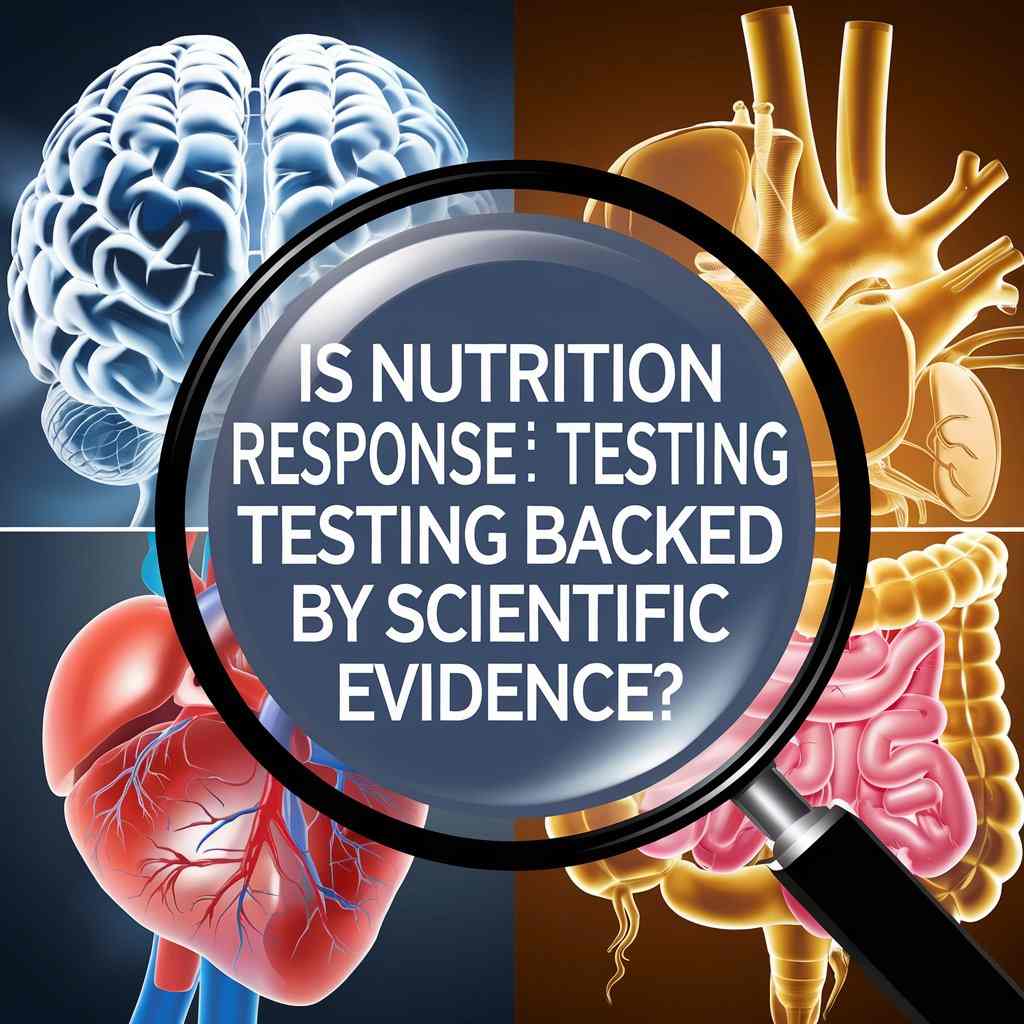(Nutrition Response Testing real or fake) is a non-invasive method assessing nutritional imbalances through muscle testing, lacking scientific support.
Nutrition Response Testing (NRT) is a method that uses muscle testing to check for nutritional imbalances. While it is popular among some, its effectiveness lacks strong scientific backing, leading to mixed opinions on its credibility.
What is Nutrition Response Testing?

Nutrition Response Testing is a natural and gentle way to check your body’s health and nutritional needs. To put it simply, it’s a non-invasive technique that looks at how your body responds to certain tests to find out if there are any imbalances or deficiencies.
Here’s how it works: A practitioner will lightly press on specific areas of your body while asking you to resist with a muscle, like holding your arm steady. They believe this can help pinpoint stress in different parts of your body or areas that might need extra nutritional support.
Once they’ve gathered this information, they’ll usually suggest changes in your diet, certain supplements, or tweaks to your lifestyle to help improve your health.
It’s worth noting that while some people swear by it and say it’s helped them, others question whether it’s backed by science. So, if you’re curious, it might be best to think of it as one part of your overall approach to health.
Also Read: Jack Daniels Hard Tea Nutrition Facts – Nutrition and Flavor Guide!
How does Nutrition Response Testing work?
Muscle Testing Mechanism:
The core principle of NRT involves muscle testing, where the practitioner tests the strength of a patient’s extended arm while applying pressure to specific reflex points on the body. If an organ or system is under stress, the autonomic nervous system will reduce energy to the arm, causing it to weaken or drop. This response indicates potential imbalances or dysfunctions related to that organ or system.
Identifying Stressors:
During the testing process, various stressors are evaluated, including:
- Chemical Toxicity: Exposure to harmful substances.
- Food Sensitivities: Reactions to specific foods that may cause discomfort or health issues.
- Heavy Metal Toxicity: Accumulation of metals that can impair bodily functions.
- Immune Challenges: Factors affecting immune system performance.
- Scar Interferences: Past injuries that may impact energy flow and health.
Nutritional Assessment:
Once stressors are identified, the next step is to determine nutritional deficiencies caused by these stressors. The practitioner then recommends specific whole food supplements—such as vitamins, minerals, and antioxidants—to restore balance and support health. Patients typically start noticing improvements within 4 to 6 weeks of following their personalized nutrition plan.
Is Nutrition Response Testing backed by scientific evidence?

The simple answer is: There isn’t much solid scientific proof for Nutrition Response Testing (NRT).
Let me explain: NRT uses things like muscle testing to figure out what’s going on in your body. However, these methods aren’t widely accepted by most doctors or scientists. This is because the results depend a lot on what the practitioner observes, which makes it tricky to test or prove in a scientific way.
So far, there haven’t been enough big, reliable studies to show that NRT really works. Many experts believe that any improvements people notice might just come from the placebo effect—where you feel better because you believe the treatment will work—or from making simple changes, like eating healthier or taking supplements.
That said, some people say they feel better after trying NRT, and that’s okay too. If you’re curious about it, it’s good to keep in mind that it shouldn’t replace real medical care. Always talk to your doctor first to make sure it’s safe and fits with your overall health plan.
Why do some people consider Nutrition Response Testing fake?
Some people think Nutrition Response Testing (NRT) is fake because it doesn’t have much scientific support, and its methods can seem unusual or hard to believe.
Here’s why:
- Lack of scientific proof: NRT relies on muscle testing and reflexes to assess health, but these methods haven’t been backed up by solid, peer-reviewed research. Without scientific studies to prove it works, many people are skeptical.
- Subjective results: The test outcomes depend a lot on what the practitioner observes or feels during the session. This makes it hard to standardize or confirm the results in a reliable way.
- Unconventional methods: NRT doesn’t use traditional medical tools like blood tests or imaging. For some people, this makes it seem less credible compared to evidence-based practices.
- Placebo effect: Critics argue that any benefits people feel might just come from believing the treatment will help, rather than from the testing itself.
That being said, some people swear by it and feel it’s helped them. It really comes down to personal beliefs and experiences. If you’re considering NRT, it’s important to combine it with advice from a trusted doctor to make sure you’re covering all your health needs.
Also Read: Kirkland Greek Yogurt Nutrition Facts – A Healthy Choice for Your Diet!
What do proponents of Nutrition Response Testing say?
Proponents of Nutrition Response Testing (NRT) believe it is an effective and safe way to improve health by addressing the body’s unique nutritional needs. They argue that NRT offers benefits beyond what conventional medicine can provide.
Here’s what they typically say:
Holistic and root-cause focused:
Advocates of NRT praise it for looking at the whole body rather than focusing on isolated symptoms. They believe that many health issues stem from imbalances in nutrition or stress on specific organs, and NRT aims to address the root cause rather than just masking symptoms with medications.
Personalized and unique:
Unlike a one-size-fits-all approach, NRT is said to be tailored to the individual. Practitioners use muscle testing to pinpoint specific deficiencies or stressors unique to each person. Based on this, they create a plan involving specific dietary changes, supplements, or detox protocols.
Non-invasive and drug-free:
One of the biggest selling points for NRT is that it’s non-invasive. It doesn’t require blood draws, imaging, or any uncomfortable medical procedures. Supporters also like that it’s drug-free, relying on natural remedies and nutritional adjustments instead of pharmaceuticals.
Tangible health improvements:
Proponents often share success stories of feeling more energized, having better digestion, sleeping more soundly, and seeing improvements in conditions like chronic pain, fatigue, or skin issues. These anecdotal experiences are a major reason why people continue to use and recommend NRT.
Preventive care:
NRT is often described as a tool for preventive health. Practitioners claim it can detect imbalances or stress in the body before they develop into more serious illnesses. This makes it appealing to people who want to take a proactive approach to their well-being.
Helps when other methods fail:
Many supporters turn to NRT after traditional treatments have not provided relief. They feel it offers answers when conventional testing or treatments don’t identify the root cause of their problems.
Compatible with other health approaches:
Proponents argue that NRT can work alongside other forms of healthcare. They don’t see it as a replacement for conventional medicine but as a complementary method to enhance overall health and recovery.
Focus on natural healing and detoxification:
Advocates highlight NRT’s focus on eliminating toxins, which they believe can interfere with the body’s natural healing processes. They appreciate how NRT emphasizes supporting the body with whole foods and natural supplements.
Empowers patients:
Supporters often say that NRT makes them feel more in control of their health. By learning how their body responds to different foods and stressors, they feel empowered to make healthier choices.
It works for me” philosophy:
Many who believe in NRT rely on personal or community testimonials. They argue that even if it’s not scientifically proven, their lived experiences and results make it a valid option for improving health.
Proponents acknowledge that it’s not mainstream and that more scientific research is needed. However, they often emphasize the value of results over validation, claiming that the improvements they experience speak for themselves. For them, NRT is a complementary tool to traditional healthcare, offering insights that might otherwise go unnoticed.
What are common alternatives to Nutrition Response Testing?
Common alternatives to Nutrition Response Testing include:
- Blood Tests and Lab Work:Check for nutrient deficiencies, allergies, or imbalances.
- Consultations with Dietitians:Evidence-based dietary advice tailored to your needs.
- Functional Medicine:Holistic health assessment using validated methods.
- Elimination Diets:Identify food sensitivities by tracking and removing trigger foods.
- Gut Health Testing:Analyze digestion and microbiome health.
- Hair Mineral Analysis (HTMA): Assess mineral levels and potential toxin exposure.
- Biofeedback:Non-invasive tests measuring the body’s responses to stress.
- Nutrigenomics:DNA-based insights into your unique nutritional needs.
Choose an approach that aligns with your health goals and consult a healthcare professional for guidance.
Where can I find unbiased information about Nutrition Response Testing?
To find unbiased information about Nutrition Response Testing (NRT), consider these reliable sources:
Medical and Health Websites:
Websites like Mayo Clinic, WebMD, or Cleveland Clinic provide balanced information about alternative health practices.
Peer-Reviewed Research Articles:
Search for studies on platforms like PubMed or Google Scholar to see if there’s scientific evidence for or against NRT.
Professional Organizations:
Groups like the Academy of Nutrition and Dietetics or American Medical Association often discuss complementary and alternative health practices.
Trusted Healthcare Professionals:
Consult your doctor or a registered dietitian for an evidence-based perspective on NRT and its claims.
Consumer Advocacy Groups:
Organizations like Quackwatch examine health trends and alternative therapies critically.
Libraries and Educational Institutions:
University libraries or health sciences departments can offer books and resources on alternative health topics.
By exploring these sources, you can get a clearer, more objective understanding of NRT and its potential benefits or drawbacks.
FAQ’s
1. What is Nutrition Response Testing (NRT)?
NRT is a method that uses muscle testing to identify areas of stress or nutritional imbalances in the body. Practitioners may recommend dietary changes and supplements based on the results.
2. Does NRT have scientific backing?
There isn’t much scientific evidence supporting NRT. Critics argue the results are subjective and could be due to the placebo effect rather than the technique itself.
3. Why do some people think NRT is fake?
NRT is criticized for lacking scientific validation and relying on subjective muscle testing, which makes it seem untrustworthy to some people.
4. What do NRT supporters believe?
Supporters argue that NRT provides personalized, non-invasive solutions for improving health, addressing root causes of issues, and enhancing overall wellness.
5. What are some alternatives to NRT?
Alternatives include blood tests, consultations with dietitians, functional medicine, elimination diets, and gut health testing, all of which have more scientific backing.
Conclusion:
In conclusion, Nutrition Response Testing (NRT) is a non-invasive technique that uses muscle testing to assess nutritional imbalances. While some people find it beneficial, it lacks strong scientific support and is considered questionable by many healthcare professionals. Those interested should consult with a trusted doctor to ensure comprehensive care.